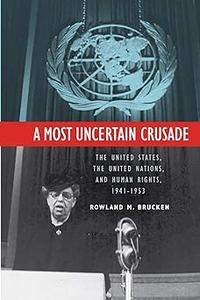F
Frankie
Moderator
- Joined
- Jul 7, 2023
- Messages
- 101,954
- Reaction score
- 0
- Points
- 36

Free Download Rowland Brucken, "A Most Uncertain Crusade: The United States, the United Nations, and Human Rights, 1941-1953"
English | ISBN: 0875804713 | 2013 | 450 pages | EPUB | 2 MB
A Most Uncertain Crusade traces and analyzes the emergence of human rights as both an international concern and as a controversial domestic issue for US policy makers during and after World War II. Rowland Brucken focuses on officials in the State Department, at the United Nations, and within certain domestic non-governmental organizations, and explains why, after issuing wartime declarations that called for the definition and enforcement of international human rights standards, the US government refused to ratify the first UN treaties that fulfilled those twin purposes. The Truman and Eisenhower administrations worked to weaken the scope and enforcement mechanisms of early human rights agreements, and gradually withdrew support for Senate ratification. A small but influential group of isolationist-oriented senators, led by John Bricker (R-OH), warned that the treaties would bring about socialism, destroy white supremacy, and eviscerate the Bill of Rights. At the UN, a growing bloc of developing nations demanded the inclusion of economic guarantees, support for decolonization, and strong enforcement measures, all of which Washington opposed.
Prior to World War II, international law considered the protection of individual rights to fall largely under the jurisdiction of national governments. Alarmed by fascist tyranny and guided by a Wilsonian vision of global cooperation in pursuit of human rights, President Roosevelt issued the Four Freedoms and the Atlantic Charter. Behind the scenes, the State Department planners carefully considered how an international organization could best protect those guarantees. Their work paid off at the 1945 San Francisco Conference, which vested the UN with an unprecedented opportunity to define and protect the human rights of individuals.
After two years of negotiations, the UN General Assembly unanimously approved its first human rights treaty, the Genocide Convention. The UN Commission on Human Rights (UNCHR), led by Eleanor Roosevelt, drafted the nonbinding Universal Declaration of Human Rights in 1948. Subsequent efforts to craft an enforceable covenant of individual rights, though, bogged down quickly. A deadlock occurred as western nations, communist states, and developing countries disagreed on the inclusion of economic and social guarantees, the right of self-determination, and plans for implementation.
Meanwhile, a coalition of groups within the United States doubted the wisdom of American accession to any human rights treaties. Led by the American Bar Association and Senator Bricker, opponents proclaimed that ratification would lead to a U.N. led tyrannical world socialistic government. The backlash caused President Eisenhower to withdraw from the covenant drafting process. Brucken shows how the American human rights policy had come full circle: Eisenhower, like Roosevelt, issued statements that merely celebrated western values of freedom and democracy, criticized human rights records of other countries while at the same time postponed efforts to have the UN codify and enforce a list of binding rights due in part to America's own human rights violations.
Recommend Download Link Hight Speed | Please Say Thanks Keep Topic Live
FileBoom
64yr1.zip
Rapidgator
64yr1.zip.html
NitroFlare
64yr1.zip
Uploadgig
64yr1.zip
Fikper
64yr1.zip.html
Links are Interchangeable - Single Extraction
